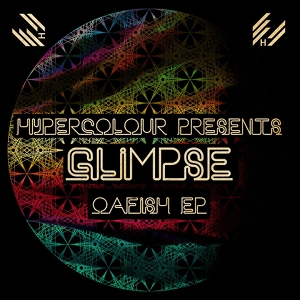Glimpse Oafish
The first thought that crosses the mind while listening to Oafish, the latest EP from […]

The first thought that crosses the mind while listening to Oafish, the latest EP from Glimpse (a.k.a. Christopher Spero), is that it sounds awfully familiar. As it turns out, some of it is. The first track, “Caught on a Train,” is actually a re-release—it occupied the same position on 100% Black, a 2007 EP on Spero’s now-defunct Glimpse imprint. Here, it’s once again being placed center stage, though it’s now backed by three entirely new cuts. Nevertheless, listening through the record, it’s clear that the issue isn’t only the literal familiarity with a single song. As the EP wears on, it’s hard to shake the feeling that many of the sounds and ideas have already been expressed better elsewhere.
Funnily enough, “Caught on a Train” is the only song on the EP that doesn’t feel stuck to a modern formula. This might have something to do with where it’s coming from—there just aren’t that many people trying to make this kind of minimal tech house in 2012. But discounting that for a second, it’s a track that could easily work on a dancefloor, with a driving pulse of synths that emulates the swaying rhythm of its namesake. It beats across its relatively long nine-minute runtime and finds itself in its element towards the end, when Spero begins to bring in short, playful snippets of tuba, cheap organ, and toy piano.
“What you waiting for?/Shake that ass/Get your ass on the floor.” So says the nauseating hook in the titular song, as a crunching and spacey rhythm unfolds beneath it. Though there might be some irony between the title and the lyrics, the track lands squarely in the realm of pop tech house, ultimately sounding like another addition to a growing pile of tracks built around cheesy vocal hooks and easy loops.
The title irony continues with “Hubris,” a cut built around a creative pilfering of Kelis’ “Milkshake.” As one might expect, her appearance on the record is in the shape of a transposed sample that spins around while filtering in and out of focus. Used in this context, it’s difficult to not immediately think of the way that bass music has run the technique into the ground; it’s unfortunate, because without the appropriation, the track’s smartly laid out drums and weirdly placed pads may have provided one of the record’s better moments.
Instead, that distinction belongs to EP closer “Labbit.” More restrained and lacking coherent vocals, it has the breathing room to develop into something that’s atmospheric, dark, and oddly funky. But then a noticeable 808 cowbell goes off and a realization hits: just like the EP it comes from, it’s well produced, but it’s nothing that hasn’t been heard before.

